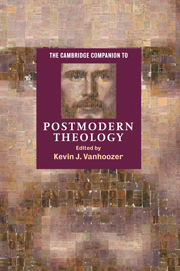Book contents
- Frontmatter
- Part 1 Types of postmodern theology
- 1 Theology and the condition of postmodernity
- 2 Anglo-American postmodernity
- 3 Postliberal theology
- 4 Postmetaphysical theology
- 5 Deconstructive theology
- 6 Reconstructive theology
- 7 Feminist theology
- 8 Radical orthodoxy
- Part 2 Christian doctrine in postmodern perspective
- Index
7 - Feminist theology
from Part 1 - Types of postmodern theology
Published online by Cambridge University Press: 28 May 2006
- Frontmatter
- Part 1 Types of postmodern theology
- 1 Theology and the condition of postmodernity
- 2 Anglo-American postmodernity
- 3 Postliberal theology
- 4 Postmetaphysical theology
- 5 Deconstructive theology
- 6 Reconstructive theology
- 7 Feminist theology
- 8 Radical orthodoxy
- Part 2 Christian doctrine in postmodern perspective
- Index
Summary
Even with all their diversity, feminist, womanist, and mujerista theologies have one thing in common: they make the liberation of women central to the theological task. This is not to say that there is complete consensus concerning the ends of such liberation. For example, feminists who argue that the flourishing of women is achieved by resistance to sexism are criticized by those who claim that such patterns unduly privilege the category of gender. Despite these conflicts, however, feminist, womanist, and mujerista theologians have historically shared a general liberation hermeneutic, marked, at least in part, by commitments around identity. Rather than positioning themselves as generic “theology,” these works emerged out of situations of oppression for marginalized groups that initiated critical assessments of existing social, ecclesial, and theological structures. The result has been liberative interpretive practices crafted from new combinations of the tradition and contemporary resources.
Postmodernism enters this theological discourse by providing resources designed to advance such liberative ends. The primary litmus for any postmodernism will be its contribution to analyses of the complexities of gender, race, sexual, and class oppressions. What is “post” about such resources is their refusal of some of the “modern” habits in theology, but only those that inhibit exploration of these conditions of oppression.
- Type
- Chapter
- Information
- The Cambridge Companion to Postmodern Theology , pp. 109 - 125Publisher: Cambridge University PressPrint publication year: 2003

